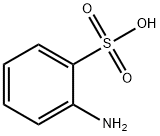Chemical Properties
LIGHT BROWN FINE CRYSTALLINE POWDER
Definition
ChEBI: An aminobenzenesulfonic acid carrying an amino group at position 2.
Production Methods
2-Aminobenzenesulfonic acid (Aniline-2-sulfonic acid) is obtained from 2-nitrothiophenol by boiling in a mixture of dioxane and water (ratio 20:1) for seven hours; the yield is 86.7% of theory. The acid can also be produced as follows: 2-chloronitrobenzene is reacted with sodium disulfide in aqueous alcoholic solution to form 2,2'-dinitrodiphenyl disulfide. After having been dissolved in a mixture of hydrochloric acid and nitric acid this is oxidized with chlorine to form 2-nitrobenze- nesulfonyl chloride, which is then hydrolyzed with soda solution and finally reduced with iron turnings. Alternatively 2,2'-dinitrodiphenyl disulfide can first be reduced to 2,2'- diaminodiphenyl disulfide and then oxidized with hydrogen peroxide in aqueous sulfuric acid to 2-aminobenzenesulfonic acid.
2,2'- Diamino-diphenyldisulfide can also be arrived at by alkaline hydrolysis of benzothiazole or mercaptobenzothiazole, followed by oxidation with hydrogen peroxide. The additional oxidation leading to 2-aminobenzenesulfonic acid can be performed in alkaline solution. Thus the synthesis starting from benzothiazole can be carried out exclusively in alkaline solution in a single reactor. Yield: 70%, based on benzothiazole.
General Description
Light brown powder.
Air & Water Reactions
Soluble in water.
Reactivity Profile
Aniline-2-sulfonic acid is an amino acid. Reacts weakly with both acids and bases.
Fire Hazard
Flash point data for Aniline-2-sulfonic acid are not available, however Aniline-2-sulfonic acid is probably combustible.
Flammability and Explosibility
Non flammable
Purification Methods
Crystallise orthanilic acis from aqueous solution, containing 20mL of conc HCl per L, then crystallise it from distilled water, and dry it in a vacuum desiccator over Sicapent (m 315o). When an aqueous solution is chilled below 13.5o, the hydrated form of the acid is obtained. It is used for the determination of nitrite and nitrate. The S-benzylisothiuronium salt has m 137o (from H2O). [Wertheim Org Synth Coll Vol II 471 1943, Beilstein 14 H 681, 14 I 714, 14 II 429, 14 III 1896, 14 IV 2638.]





